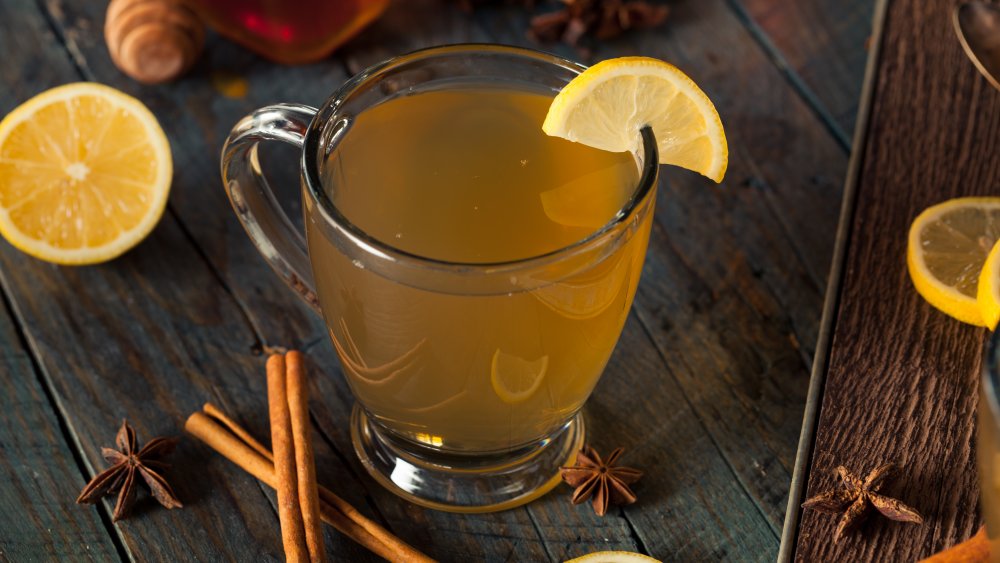When You Drink Scotch Every Day, This Is What Happens To Your Body
If you drink scotch every day, chances are you're not doing it for the health benefits. More than likely you simply find indulging in a nightcap before bed to be an enjoyable experience. That's not to say scotch is without healing properties, though. As the director general of the Scotch Whisky Association, Hugh Morison, pointed out to BBC News, the word "whisky" stems from the Gaelic term "uisge beatha," meaning "water of life." This is especially true of Scottish whisky.
You see, although all types of scotch are considered whisky, not all types of whisky (or whiskey) are considered scotch. As HuffPost explained, "Technically, scotch is whisky (spelled without the "e") that must be produced in Scotland, made from mostly malted barley and aged in oak barrels for three years or more."
Different forms of whiskey are, naturally, produced differently. Bourbon, rye, and scotch, for example, all have a unique combination of ingredients, which not only means their flavors vary, but they also each provide different benefits to the drinker. So, what does drinking scotch every day do to your body? Well, you'll want to keep on reading.
If you drink scotch every day, it may be good for your heart
In a study sponsored, in part, by the Scotch Whisky Research Institute, researchers at the Rowan Research Institute in Aberdeen, Scotland, tested wine; a 12-year-old, cask-aged malt whisky; and a newly-distilled whisky to determine the health benefits of each, BBC News reported. In the end, the researchers found that both red wine and aged whisky "[raised] the body's level of antioxidants," which, in turn, "helped to protect against coronary heart disease." Non-aged whiskey, however, had no such benefits. The study also found that those who drank the aged whisky as opposed to the wine were able to absorb more phenols, a beneficial chemical that helps protect against heart disease.
Other types of alcohol have also been found to protect against heart disease, the researchers noted in their study, but the news about whisky is nevertheless exciting. "This research is yet further evidence that the moderate consumption and enjoyment of all alcoholic beverages is beneficial to health," Hugh Morison, the director general of the Scotch Whisky Association, explained.
You may protect yourself from having a stroke if you drink scotch every day
A team of researchers from the State University of New York (SUNY) at Potsdam led by Professor David J. Hanson in 2011 discovered that people who drink one to two servings of whiskey every day halved their chances of having a stroke in old age (via Canadian Pharmacy King). And as scotch is a type of whiskey, we can assume these benefits extend to scotch.
According to Healthline, there are three main types of strokes with subcategories of each. Despite their differences, though, most strokes have the same cause: blood clots. It makes sense then that scotch would be able to help. According to the North American pharmacy Canadian Pharmacy King, scotch "acts as a natural blood thinner." As such, it can lower a person's risk for developing blood clots that could later lead to a stroke.
Although this health benefit is not unique to scotch, scotch is particularly helpful in preventing strokes. "The composition of Scotch whisky can actually reduce the risk of strokes as it removes unnecessary cholesterol from the body as it prevents cholesterol from clogging the cardiovascular system, relaxes the walls of the arteries, and thins the blood to reduce the risk of an ischemic (clot-caused) stroke," the pharmacy explained.
Could drinking scotch every day help protect you from cancer?
In the United States, cancer is the second leading cause of death among men and women, according to the American Cancer Society. The organization highlights a number of things a person can do to reduce their risk of developing cancer, such as exercising daily and eating well, but there may be something else worth trying. Although drinking alcohol has been linked to certain types of cancer and the American Cancer Society advises limiting your alcohol intake, scotch could just play a unique role in preventing cancer, too.
According to Dr. Jim Swan, who consults with the drinks industry, single malt whiskies contain high levels of ellagic acid, as reported by The Telegraph. Although red wine does as well, the content in whiskey is much higher. "So, whether you indulge in the odd tipple, or you are a serious connoisseur, whisky can protect you from cancer and science proves it," the expert revealed at a EuroMedLab conference in Glasgow, Scotland in 2005.
That doesn't mean you should look to scotch as a medicinal elixir, though. "Ellagic acid is a powerful antioxidant but that does not mean it is necessary to hit the bottle," Dr. Lesley Walker, the director of cancer information at Cancer Research UK, told The Telegraph. Ellagic acid is also found in some fruits, she explained.
You might be able to reduce your risk of dementia if you drink scotch every day
Thanks to advances in medical science, people are living longer. However, according to the United Kingdom's National Health System (NHS), that means there are more and more people living with dementia. As of March 2020, some 5 million Americans over the age of 65 were living with Alzheimer's dementia, a report by the Alzheimer's Association revealed. Sadly, the majority of primary care doctors expect this number to keep on growing.
Interestingly, though, a 2011 study conducted by Dr. David J. Hanson, a sociology professor emeritus at the State University of New York (SUNY) at Potsdam, revealed that people who consumed anywhere from one to two drinks of whiskey had a 50 percent reduced risk of developing dementia in their elderly years, as reported by Canadian Pharmacy King.
Although scotch may be the best man for the job, Canadian Pharmacy King quoted Hanson as saying that all alcoholic beverages have the power to "significantly [reduce] the risk of ... dementia." This is because these benefits come "from the alcohol itself."
If you drink scotch every day, it probably won't sabotage your diet
Despite its complex flavor profile, scotch contains no carbohydrates, sugar, salt, or fat, making it one of the lowest-calorie alcoholic drinks one can have and thus a drink that's not going to ruin any attempts you may have to lose weight. Rebecca Lewis, a registered dietitian at HelloFresh, told Self that scotch happens to be her personal drink of choice. "My favorite is Macallan 12-year aged Scotch," she revealed. "I like to avoid sugary mixers like juice, and since Scotch is stronger I sip it slower and one glass can last me the whole evening."
Although Lewis likes her scotch "neat," meaning it's poured straight from the room-temperature bottle to a glass with nothing else added, scotch is also commonly served with calorie-free add-ins, like water or ice. You can certainly make a scotch cocktail, but that will, of course, up the calories. However, mixers aren't the only way to infuse a smattering of different flavors into your drink. Blended scotch — a mix of two or more single malts in one bottle — are "basically mixology in itself," Jon Linstead, a bartender and bar manager in Edinburgh, Scotland, explained to VinePair.
Drinking scotch every day may worsen acid reflux
If you suffer from acid reflux, you may find scotch to be less like the "water of life" and more like the fire of hell. As part of a 1987 study conducted by researchers at University of Dundee in Scotland and published in the Journal of the American Medical Association, 17 participants drank scotch three hours after having dinner and went to sleep that night at their usual times. Seven of the 17 participants went on to experience episodes of acid reflux — which lasted just over 47 minutes on average — while lying down. When scotch was removed from the experiment, however, not one of the participants experienced acid reflux.
Although scotch was the drink of choice for this experiment, it's not the only type of alcohol that has the ability to cause heartburn. In fact, all types of booze can cause indigestion. "Alcohol has a direct effect [on acid reflux]," Kevin Ghassemi, a gastroenterologist at the University of California, Los Angeles, revealed to NPR. "Temporarily, of course." Alcohol tends to relax the muscles between the esophagus and stomach, which creates a passageway for stomach acid to "come back up into the esophagus, and that's reflux," Ghassemi added.
You could treat toothache pain with scotch
If you're ever had a toothache, you don't need us to tell you how much it hurts. But, for those who haven't experienced what feels like a unique form of torture, we'll fill you in. A toothache happens when the "pulp" of a tooth becomes inflamed, as WebMD explained. In the pulp are nerve endings that the site described as being "very sensitive to pain." Although you'll want to schedule an appointment with a dentist to take care of the problem, you're going to want a temporary solution to quell the pain.
Three Rivers Dental, a Washington-based dental clinic, recommends a unique home remedy to help you get by until your appointment. Adults 21 and over can find relief by soaking a cotton ball in scotch — whiskey, brandy, or vodka would work too — and hold it against the problem tooth. "In other cases, simply swishing some alcohol around in the area near the tooth will help," the clinic explained. Although you can use this remedy until you're able to see a dentist, it's important to remember this only treats pain; it will not solve the root of the problem.
Drinking scotch every day can help your body battle inflammation
A study published in the European Journal of Clinical Nutrition found that 12-year-old, cask-aged Scotch whisky was able to raise a person's level of antioxidants even more so than red wine, as reported by BBC News. Antioxidants are important for several reasons, but are especially useful for fighting inflammation, Shawn Talbott, an expert in nutrition and dietetics, revealed to ShareCare. Although antioxidants aren't just found in wine and scotch, the latter is especially rich in antioxidants. "In an Australian study done at Monash University, whiskey had so much antioxidant activity that it surpassed what you'd get from the ascorbic acid available in a glass of regular orange juice," reported the Health & Wealth Bulletin.
However, the kind of whiskey you choose matters. Based on the study published in the European Journal of Clinical Nutrition, BBC News reported there was "a marked fall in antioxidant capacity" in participants after they consumed newly-distilled whisky as opposed to aged scotch, possibly due to the amount of copper in non-matured whisky.
Drinking scotch every day won't prevent you from getting sick
As the old wives' tale goes, whiskey can cure the common cold. While it's true that scotch is rich in the antioxidant ellagic acid, the drink isn't exactly a miracle tonic. A hot toddy — a warm drink made from scotch or another type of whiskey with lemon and honey — can provide some momentary relief from your cold or flu.
"It would not have an effect on the virus itself, but its effect on the body can possibly give you some modest symptom relief," William Schaffner, an esteemed infectious disease specialist and chair of preventive medicine at Vanderbilt University Medical Center in Nashville, Tenn., told ABC News. "The alcohol dilates blood vessels a little bit, and that makes it easier for your mucus membranes to deal with the infection." Because the drink is served hot, the temperature alone can also help relieve your symptoms. Yet and still, a nightly hot toddy isn't going to protect you against coming down with the flu or even a cold.
You can keep your blood sugar levels in check by drinking scotch every day
Ellagic acid is a pretty wonderful component of scotch as it's useful for curbing inflammation and fighting cancer, but that's actually not all it does. "We hear a lot about how healthy wine is because of its high antioxidant content, but whisky contains just as many," David Friedman, nutritionist and author of Food Sanity: How to Eat in a World of Fads and Fiction, explained to MEL magazine when discussing scotch and bourbon. Or, as one study (via BBC News) demonstrated, even more than wine. "Whisky gets its amber coloring from being aged in wooden barrels," Friedman continued, "which also creates ellagic acid, and the ellagic acid in whiskey can help keep blood sugar levels in check."
This is a big deal because unregulated blood sugar can lead to kidney and nerve damage as well as heart disease and stroke, according to WebMD. "It's something to be careful of whether you have diabetes or not," the site cautioned.
Could you live longer if you drink scotch every day?
How would you like to live for over a century? Grace Jones, affectionately referred to as Amazing Grace, lived to be 112 years old. Until her death in June 2019, she was Britain's oldest person. She was also active up until her passing, as her daughter, Deirdre McCarthy, revealed to BBC News. In 2016, when Jones was the tenth oldest person in the UK, she credited something unusual for her longevity. "I never miss my night cap," she told The Scotsman. "All I have is the whisky at night." Famous Grouse scotch, specifically, was her drink of choice.
"I started having a nightly tot of it when I turned 50 so I've been having it every night for the last 60 years and I certainly have no intention of stopping now," she explained. "My doctor said 'keep up with the whisky Grace, it's good for your heart.'" Well, we're sold.











